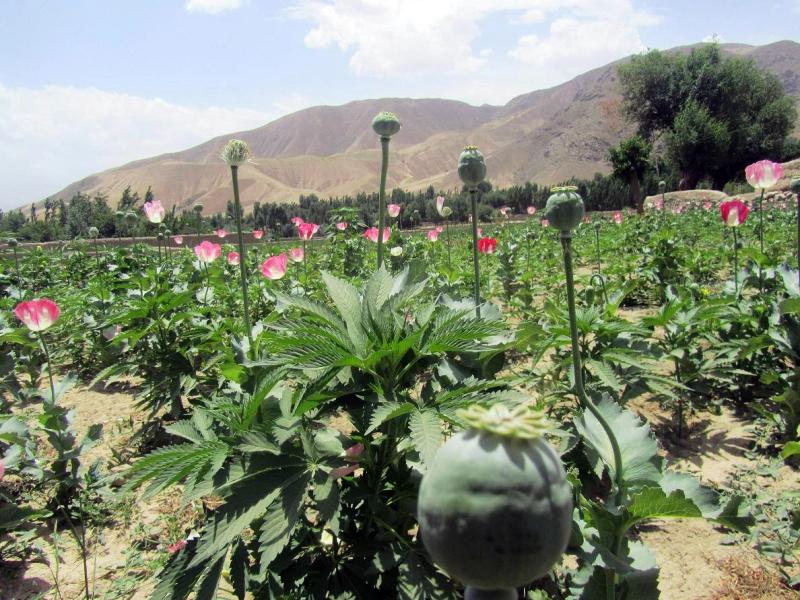LASHKARGAH (Pajhwok): Farmers claim local officials have allowed them to cultivate poppy crops in their fields in return for money in southern Helmand province, the world’s leading opium producing region.
The growers say the government has ignored the issue of poppy cultivation and local officials have allowed the illicit plant’s cultivation in exchange for heavy bribes.
Wishing not to be named, these growers in Nad Ali, Marja, Garamsir, Nawa, Greshk and other districts say the poppy crop has become a major source of income for local officials.
A farmer in Nad Ali district told Pajhwok Afghan News that local officials had told them to cultivate poppies in their fields and they should not fear the crop’s destruction by the government.
The grower claimed the illicit plant was grown this year in all the districts and the anti-poppy campaign had been put on hold by local officials in order to collect bribes.
A government official in Lashkargah, the provincial capital, confirmed officials in districts had allowed poppy cultivation in return for millions of Pakistani rupees.
The official, who spoke on condition of anonymity, said the anti-poppy campaign was supposed to be initiated three weeks ago, but it had been put on hold. “Besides district officials, high-ranking officials are also involved in the issue,” he said.
A resident of Marja district, Abdul Ahad, said the government had promised giving in assistance wheat seeds, chemical fertiliser and other agricultural inputs to farmers, but was yet to honour its words.
He said the government’s failure to provide farmers with the promised materials had resulted in increased poppy cultivation.
“Previously, people would cultivate poppy crops in areas under control of insurgents, but this year the crop is grown in government-controlled areas on a larger scale,” Ahad said.
Another resident of Marja, Mara Jan, said other crops could not satisfy the needs of farmers for their low price in the market and thus their urgency to grow poppy crop.
He said no government official had so far warned farmers against cultivating poppy plant in their fields and they were hopeful their crops would not be eradicated.
Another resident, Abdul Ghafoor, said economic problems forced farmers into growing the illicit crop.
Meanwhile, the Garamsir district chief, Ayub Omar Omari, said the provincial Counternarcotics Department lacked financial resources to conduct anti-poppy campaign and owed 2.3 million afghanis to tractor owners who participated in previous campaigns.
Omari said anti-poppy campaigns needed tractors and tractor owners, who had not been paid their wages, were reluctant to destroy the crops this time.
The district chief said all government-provided tractors for poppy eradication were out of order and that was why, the crop could not be destroyed in many areas last year.
“Due to this, some farmers think officials are taking bribes not to destroy poppy crops grown by others,” the district said, adding the accusations would increase if the faulty tractors were not repaired to destroy poppies this season.
Meanwhile, deputy governor Mohammad Jan Rassoulyar also acknowledged the increase in cultivation of poppy crop in Helmand this year against last year’s cultivation.
However, he said they had no evidence if local officials were involved in allowing farmers to grow the plant. He said if local officials were found guilty, they would be referred to judicial organs.
Counternarcotics chief for Helmand, Lal Mohammad Azizi, said they had not yet launched the anti-poppy campaign, but were planning to initiate it in the next few days.
He said they planned to destroy poppy crops grown over 5000 hectors of land in Helmand.
Azizi confirmed owing money to campaigners and that all tractors were in faulty conditions, but said the issue would be resolved and the tractors repaired in order to launch the anti-poppy drive as per the plan.
He said they had no exact information about how much land was brought under poppy cultivation this year, but a 10 percent increase was anticipated.
Last year, the poppy crop was grown over 103,000 hectors of land in Helmand and the authorities had claimed destroying the plant on only 2150 hectors of land against the planned 10000 hectors.
However, the Ministry of Counternarcotics had confirmed the destruction of the plant on only 700 hectors last year.
ma








GET IN TOUCH
NEWSLETTER
SUGGEST A STORY
PAJHWOK MOBILE APP